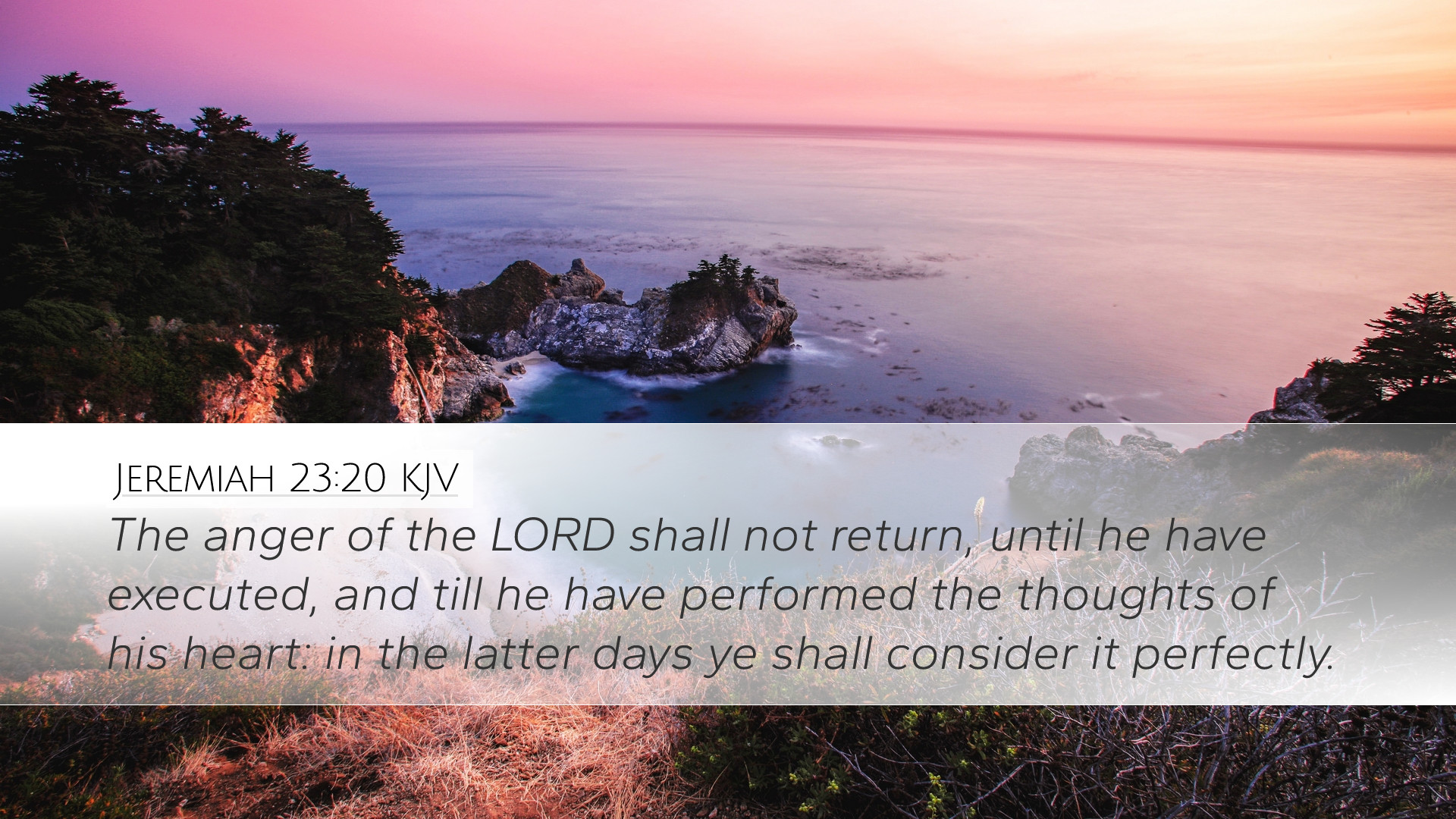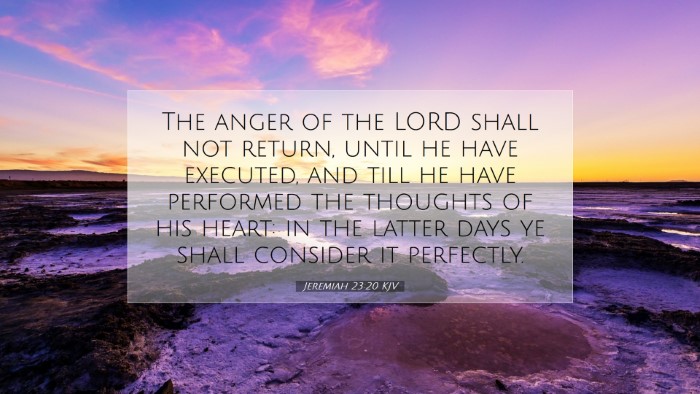Bible Commentary on Jeremiah 23:20
Verse Context: Jeremiah 23:20 reads, "The anger of the LORD shall not return, until he have executed, and till he have performed the thoughts of his heart: in the later days ye shall consider it perfectly." This verse occurs in a broader context where the prophet Jeremiah delivers God's message regarding the false prophets and the impending judgment upon Israel.
Introduction
Jeremiah 23:20 serves as a pivotal reminder of God's sovereign will and the unyielding nature of His purpose. The verse speaks of God's anger—an essential theme in the prophetic books, revealing the divine displeasure towards sin and disobedience. In this commentary, we will draw insights from renowned public domain scholars such as Matthew Henry, Albert Barnes, and Adam Clarke to explore the implications of this verse for pastors, students, theologians, and Bible scholars.
Exegesis of the Verse
Divine Anger and Judgment
Matthew Henry emphasizes that the anger of God is not capricious but rather a holy response to human sin. His commentary explains that God's anger will not cease until He has fully executed His plans—reflecting both immediate and eschatological dimensions. Henry notes that the phrase "till he have performed the thoughts of his heart" signifies the certainty of God’s judgment, suggesting that nothing will thwart God’s intentions.
Consideration of God's Plans
Albert Barnes further elucidates on the phrase "in the later days ye shall consider it perfectly," positing that this could refer to a future time when God's plans are fully revealed. Barnes indicates that the realization of God's purposes often unfolds gradually, challenging believers to trust in God's timing. He remarks on the ultimate restoration and understanding that will come to God's people, urging them to maintain faith even amidst present troubles.
The Nature of Divine Purpose
Adam Clarke contributes by analyzing the notion of God’s 'thoughts' or purposes. He underscores that God’s thoughts are deep and profound, unlike human understanding. Clarke’s focus on the ‘later days’ serves to echo the prophetic tradition of looking beyond immediate outcomes to a future hope—where the fulfillment of God's promises becomes evident. This perspective challenges readers to hold on to God's word during tumultuous times.
Theological Implications
The Sovereignty of God
The sovereignty of God is a recurrent theme highlighted by all three commentators. They agree that God's will is inexorable and serves a greater purpose. This assurance provides comfort to believers, affirming that even in chaos, God’s plans are steadfast.
The Righteousness of God
In evaluating God's anger, it is crucial to understand His righteousness. The commentators emphasize that God’s wrath is not arbitrary but a necessary consequence of His holiness confronting sin. This notion serves as a call to repentance, reminding readers that the character of God demands a response from His people.
Hope and Restoration
Despite the somber tone of impending judgment, there is an underlying hope. All three scholars reflect on the duality of judgment and restoration. Jeremiah's message, while stern, also offers a glimpse of the future where Israel will return to God and recognize His truth—a theme of restoration prevalent throughout prophetic literature.
Practical Applications
For Pastors and Leaders
Pastors can draw from this verse to teach congregations about the seriousness of sin and the importance of repentance. Additionally, they should encourage their communities to remain steadfast in faith, highlighting the assurance of God’s ultimate plans for restoration.
For Students and Scholars
Students and scholars are invited to delve deeper into the themes presented in this verse, examining the grand narrative of Scripture that encompasses both judgment and grace. They are encouraged to engage with the text critically, tracing the fulfillments of God's purposes throughout biblical history.
For Personal Reflection
Believers reading this verse are called to reflect on their own lives. They should consider the implications of God’s anger against sin and the call to live righteously, attuned to the 'thoughts of God's heart.' Seeking guidance through prayer and meditating on Scripture is vital for cultivating a deeper relationship with God.
Conclusion
Jeremiah 23:20 is a profound statement on the unwavering nature of God's purposes. The insights of Matthew Henry, Albert Barnes, and Adam Clarke illuminate the text, offering a rich tapestry of interpretation that encourages the faithful to both recognize the gravity of divine anger and hold on to the hope of future restoration. As believers engage with this text, may they find both challenge and encouragement in their walk with God.


